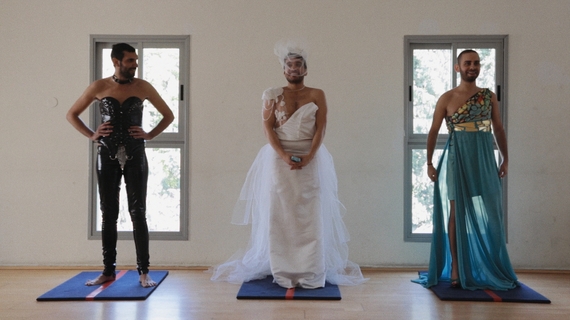On May 12, 2016, Israel celebrated 68 years of independence. Just days later, on May 15, I mourned the 68 years since the expulsion of the Palestinian people, known as the Nakba. Not all Palestinians left their homes in 1948, but it wasn't until the year 1967 that those who stayed within the borders of Israel were finally granted Israeli nationality. My family was one of the ones that stayed behind. Yet today, despite holding an Israeli passport, I often ask myself: is the citizenship of these Palestinian/Arab Israelis considered equal to those of Jewish Israelis?
Oriented is a documentary film about three gay Palestinian citizens of Israel. All three carry Israeli citizenship, but are not entitled to the same rights as Jews in the country -- so far, this sounds hard, right? But here, we are just at the beginning. These three men -- myself, and two of my best friends -- also embody the struggle of gays in Arab society, where breaking with social conventions compose a significant part of our fight. What does it means to be gay in Arab society? How does one regard gay Arabs in the international arena?
The film depicts the war of our identities, and the desire to be treated as equals in a country where we can live with our national and sexual identity of choice. While the privileged gays in developed countries fight for surrogates and marriage, as a gay Palestinian living inside of Israel, we're still fighting for the acknowledgement of our nationality, our sexuality, the LGBT community in Arab society and the legitimate right to be called Palestinians while still holding Israeli citizenship.
Oriented not only criticizes Israeli society -- it also denounces the international arena. How can it be that in 2016, Oriented is the only film where the three protagonists are Gay and Arab and are not presented as victims? Western countries tend to think about us as a single Arab unit, insular and conservative: we drink the same drinks, eat the same foods, practice the same religious traditions, are homophobic... the truth is far from this. Not all of the Arab world is Iran (and if we're talking about it, Iran isn't even actually an Arab state). The truth is, if I were to film a documentary in some of what we call the more progressive countries -- the United States, the U.K, Sweden -- I assure you that in some parts of these places, to be gay means a total suffering. There is no monopoly on being liberal: there are some countries that do it better, and there are some that do it worse.
At a time when some gays are fortunate enough to be born in the right place at the right time, Oriented focuses on us: on the people who were born in the wrong place at the wrong time and still choose to fight. Like us, there are many more people who just want to live freely on their land, with their national and sexual identities as they see fit. So, instead of seeing us and saying: "what poor souls they are, how much suffering they go through," -- help us change this reality. Because there is nothing more exciting than waking up in the morning and being proud of who and what you are.
I'm Khader, a proud Gay Palestinian who lives in a country that doesn't think of me as an equal citizen, and I will do everything, and I mean everything, I can do to change it. While you think of Arabs as terrorists and primitive people, myself, and many others, will prove to you that we can be progressive without fear.
In the Hebrew language tikva means hope. Hope is also the name of the Israeli anthem. Unfortunately, even in the anthem I'm discriminated against, but I will not let that stop me from being who I am.
